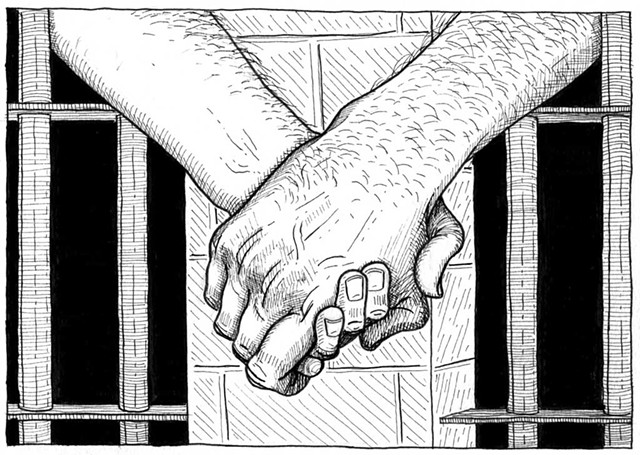Published February 26, 2014 at 4:00 a.m.
For Martin Morales, life behind bars in Vermont isn't always dreary and uneventful. At times, she says, it's been a "beautiful experience of self-discovery" of her sexual orientation and gender identity — the ultimate in forbidden love.
Morales, a 24-year-old biological male who self-identifies as gay and female, describes romantic encounters that at times sound as innocent as a middle-school crush: an exchange of love notes in the library, mutual caresses under a cafeteria table, a surreptitious kiss during Bible study. Other activities would get an NC-17 rating: For instance, Morales recounts absconding with a lover into a bathroom, hallway or mop closet for a sexual tryst while another inmate keeps the correctional officers, or COs, busy.
But Morales, who's serving a 12- to 25-year sentence for an armed home invasion in February 2011, insists she's not into "casual sex or one-night stands." Instead, she seeks out "emotionally and physically intimate" relationships with much older and "more mature" men. In fact, she credits several prison partners with teaching her about "healthy" relationships that, for the first time in her life, don't involve drugs, alcohol, self-mutilation, domestic abuse or shame.
Unfortunately for Morales, such sexual healing among inmates is strictly forbidden by the Vermont Department of Corrections, as it is in every correctional system in the United States. Under DOC policy, any "sexualized behavior" by inmates is considered a "major B" violation that can result in disciplinary sanctions. Such behavior is defined as kissing, touching, hugging, massaging, fondling or other physical contact "which produces or is intended to produce sexual stimulation or gratification." For comparison, other major B violations include vandalism, forgery, missing a head count or tampering with another inmate's food to cause harm. (Major A violations include the most serious offenses, such as homicide, arson and rioting.)
Morales has received several disciplinary reports, or "DRs," for her sexual pursuits, some resulting in segregation from the general prison population. She's even been moved to other prisons — four times in the past three years — to keep her away from her love interests, some of whom the DOC considers potential sexual predators.
In response, Morales has sued the Vermont Department of Corrections and its commissioner, Andy Pallito, for the right to pursue her romantic endeavors while incarcerated. She seeks to have consensual sex without fear of disciplinary action being taken against her or her partners.
"I see this as a fundamental human right and a constitutional issue," says Morales, who is representing herself in a federal lawsuit filed last August in U.S. District Court in Burlington. In a 79-page handwritten complaint, Morales contends that the DOC's ban on all sexual activity among inmates is unconstitutional as it "doesn't further a compelling government interest." She says inmates should be encouraged, not punished, for learning "prosocial" relationship skills that will benefit them once they've been released back into society.
The DOC doesn't comment on pending litigation, but legal experts and even prisoner advocates contacted for this story concede that Morales' suit has little chance of success; state and federal courts have consistently upheld bans on consensual sex behind bars.
Nevertheless, some observers say, the case raises valid questions about life in the correctional system. Is it realistic to expect inmates to remain completely celibate for years, or even decades? If it's widely acknowledged that mutually consensual sex occurs regularly among prisoners, is there any way to allow, or even facilitate, healthy romantic relationships without falling down the slippery slope of permitting forced or coerced sex?
Morales doesn't fit any of the usual stereotypes of transgender individuals. She shows up for her two-hour interview — conducted during normal visiting hours at the all-male Northern State Correctional Facility in Newport — looking not too different from other male inmates in the visitors' room. She's 6 feet tall, 215 pounds, with short, brown hair, hazel eyes and fair skin. On the morning of her interview, she's dressed in a gray T-shirt under her beige, prison-issued uniform.
Morales hasn't undergone gender-reassignment surgery or hormone-replacement therapy — if she had, the DOC would have assigned her to an all-women's prison — nor does she wear makeup, nail polish, women's clothing or other feminine accessories.
"Gender is a social construct," she explains. "I'm comfortable with my biological sex being male, but I believe my gender has both masculine and feminine components."
On February 13, 2013, Morales pled guilty to attempted kidnapping, burglary, aggravated domestic assault and violation of an abuse-prevention order. Two years earlier, Morales had broken into the Winooski apartment of an ex-girlfriend and robbed her at knifepoint. Morales, who admits she did it to get money to buy cocaine, expresses remorse for her crime, which she describes as "horrible" and "atrocious."
Still, there were extenuating circumstances. Morales claims that two nights before the attack — her only violent offense and criminal conviction — she confronted a Catholic priest from her hometown of Cairo, N.Y., whom she alleges sexually abused her from ages 7 to 14 while she was an altar boy.
"I wanted some power and control in a sick way over him," Morales says about her 2011 confrontation with Father Jeremiah Nunan. "I wanted him to beg for mercy and cry, feel what I had felt all those years — the anger, the fear, the shame."
Morales isn't the only one to have made such accusations against Nunan. Her older brother, Ivan Morales Jr., a New York State trooper in Catskill, N.Y., has also publicly accused the parish priest of sexually molesting him when he was a boy. Their sister, Maria, currently a cadet in the Vermont Police Academy, never reported any such abuse.
In April 2012, their father, Ivan Morales Sr., held a press conference outside the Roman Catholic Diocese of Albany, N.Y., where he publicly denounced the priest for allegedly molesting both his sons, blaming him for Martin's "downfall." The elder Morales even provided reporters with photocopies of thousands of dollars in canceled checks, payable to Martin from Nunan's personal checking account. Martin claims that Nunan offered the money in exchange for sex so she could buy alcohol and drugs.
"I always knew their relationship was a little fishy, but I never put two and two together," Ivan Sr. says in a recent phone interview. "I just thought he was a normal gay priest. It all makes sense to me now."
The Moraleses' accusations led to Nunan being placed on administrative leave — and not for the first time. According to published news reports from April 2012, Nunan was previously accused of sexually abusing a minor back in the late 1960s and early '70s. Nunan denied the charges, which were never substantiated.
The district attorney's office of Greene County, N.Y., never filed criminal charges from the Moraleses' accusations, either. Repeated phone calls and emails by Seven Days to the Catholic Diocese of Albany to inquire about Nunan's current whereabouts and status within the church are unanswered as of press time.
Throughout her two-hour prison interview, Morales fidgets nervously with her hands and avoids most direct eye contact. Her minor facial tics may be due to her diagnoses of anxiety disorder, mild autism and post-traumatic stress disorder, she says, the last of which she blames on years of sexual trauma.
But Morales says she's been luckier than most gay and transgender inmates she's met. Despite being raised in a very conservative Catholic household, she describes her parents and siblings as "nurturing and empathetic" individuals who "reacted with love and support" when she came out as gay two months before going to jail.
Since then, Morales claims, she's had sex in every correctional facility she's been in — six in all — and has some sort of "intimate physical contact" with another inmate every day. While she describes this as "therapeutic," Morales says she is reluctant to tell her mental health counselor about her romantic encounters for fear of getting her partner, or herself, in hot water.
Despite the DOC's official policy, Morales claims that many COs are aware of her sexual activities and, more often than not, turn a blind eye to them. While she won't name names, she claims that some have even abetted her endeavors so that less-tolerant COs won't discover them.
"Don't get me wrong. There is some intolerance in here," Morales says. "But I've met some good staff. They've said to me, 'Marty, you are who you are. I'm not in any position to judge or deny you your right to love somebody.'"
On the morning of her interview, Morales says, she ran into a former lover in the chow line. That inmate, who's serving a life sentence for murder, was in a "foul mood," so Morales sat by his side and caressed his hand under the table throughout breakfast. When they parted, she says, "He was all laughter and smiles." She describes it as "the healing power of intimate touch."
The DOC views such behavior as far less innocent. Corrections officials justify their zero tolerance for inmate intimacy by pointing to the federal Prison Rape Elimination Act (PREA) passed by Congress in 2003. The act, which applies to all state and federal correctional facilities, is intended to detect and respond to sexual assaults behind bars, whether perpetrated by inmates or staff.
David Turner, the DOC's director of policy development, says the rationale for the no-sex policy in prison is obvious: COs and other law-enforcement agents rarely can determine whether a sexual encounter between inmates is truly consensual. According to Turner, one party in a seemingly consensual relationship could actually be strong-armed or blackmailed by threats against him or her, or against friends, partners or family members.
"Obviously, if we see two people that give the appearance of being in a relationship, whether it's sexual or not, we're going to keep our eyes on that," Turner says. "We have certain obligations, based on the PREA directive, to make sure we keep everybody safe."
Such concerns are well justified. A 2012 report by the U.S. Bureau of Justice Statistics found that more than one third of all gay and bisexual male inmates reported being sexually victimized by another inmate. By contrast, only 3.5 percent of hetero inmates reported such abuse.
Vermont is one of the few states that provide condoms to inmates on request. Dee Burroughs-Biron, the DOC's health services director, explains that Vermont adopted the policy in 1987, not as a way to condone prison sex but to stop the spread of sexually transmitted diseases, especially HIV.
Burroughs-Biron says it would be "reverse discrimination" for corrections officials to allow gay inmates to pursue romantic and sexual relationships, as Morales is seeking to do, while banning similar sexual activities among hetero inmates.
Paul Wright, executive director of the Human Rights Defense Center, a prisoner advocacy group based in Lake Worth, Fla., calls such policies "ludicrous" and "absurd" because they equate sex with rape.
"They don't come right out and say it, but basically they're sending you to prison so you're not able to have sex with anyone," says Wright, who was himself incarcerated in Washington State in the 1990s and later became a legal advocate and watchdog of the American corrections industry. "Most prisons also have rules against masturbation," he says. "If you think that one's not being violated on a regular basis, denial isn't just a river in Egypt."
What sets the American penal system apart from others in the world, he says, is that "they try to destroy the ability of people to have relationships of any kind." Wright, who married and fathered children while in prison, points out that most states have either discontinued their conjugal-visit policies, like Washington, or never allowed them, like Vermont. Mississippi, which had allowed conjugal visits since the mid-1800s, ended that policy two months ago.
But it's about more than sex, Wright adds. He points to the high cost of prison mail and phone services, restrictive visitation rules and the location of prisons far from urban areas as examples of how the penal system deprives inmates of the ability to maintain meaningful relationships with family and friends.
"If most prisoners are going to be getting out, how are you helping to make them better people from when they came in?" Wright asks. "If you accept the fact that relationships are a normal part of human existence, what are you doing to normalize that?"
For her part, Morales claims she's been subjected to more than a dozen PREA investigations. During her initial intake in the Vermont correctional system, prison staff designated her as a "victim risk" for sexual assault due to her gender identity and sexual orientation.
Nonetheless, since she went to prison in February 2011, Morales claims she's never once been raped or coerced into having sex. And, despite repeated efforts to keep her away from her lovers, Morales insists she won't stop pursuing her jailhouse affairs.
"Just like anyone, I have biological needs, and I'm not going to pretend to be celibate for 12 years while I'm in the sexual zenith of my life," she says. "Whether I prevail on the merits or not, I'm standing up for what I believe in."
The original print version of this article was headlined "Sex Cells"
More By This Author
Speaking of...
-

Vermont DOC to Overhaul Inmate Grievance System Following Audit
Dec 19, 2022 -

Should I Tell my Boyfriend That Bad Sex Is the Reason We're Breaking Up?
Nov 2, 2022 -

My Boyfriend Has Dated Three Other Women With the Same First Name as Me
Oct 12, 2022 -

My Roomie Has Sex in the Shower, and It Grosses Me Out
Sep 7, 2022 -

I'm Afraid My Penis Is Small
Jul 27, 2022 - More »
Comments
Comments are closed.
From 2014-2020, Seven Days allowed readers to comment on all stories posted on our website. While we've appreciated the suggestions and insights, right now Seven Days is prioritizing our core mission — producing high-quality, responsible local journalism — over moderating online debates between readers.
To criticize, correct or praise our reporting, please send us a letter to the editor or send us a tip. We’ll check it out and report the results.
Online comments may return when we have better tech tools for managing them. Thanks for reading.














































